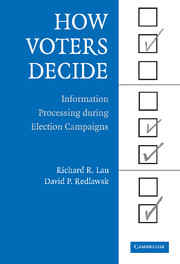Book contents
- Frontmatter
- Contents
- List of Tables and Figures
- Acknowledgments
- HOW VOTERS DECIDE
- I Theory and Methods
- 1 Introduction
- 2 A New Theory of Voter Decision Making
- 3 Studying Voting as a Process
- 4 What Is Correct Voting?
- II Information Processing
- III Politics
- IV Conclusion
- Appendix A Detailed Examples of Decision Strategies in Action
- Appendix B How the Dynamic Information Board Works
- Appendix C Overview of Experimental Procedures
- Appendix D Detailed Decision Scripts
- Appendix E Calculating the On-line Evaluation Counter
- References
- Index
- Titles in the series
3 - Studying Voting as a Process
Published online by Cambridge University Press: 05 September 2012
- Frontmatter
- Contents
- List of Tables and Figures
- Acknowledgments
- HOW VOTERS DECIDE
- I Theory and Methods
- 1 Introduction
- 2 A New Theory of Voter Decision Making
- 3 Studying Voting as a Process
- 4 What Is Correct Voting?
- II Information Processing
- III Politics
- IV Conclusion
- Appendix A Detailed Examples of Decision Strategies in Action
- Appendix B How the Dynamic Information Board Works
- Appendix C Overview of Experimental Procedures
- Appendix D Detailed Decision Scripts
- Appendix E Calculating the On-line Evaluation Counter
- References
- Index
- Titles in the series
Summary
Presidential campaigns are inherently dynamic events that occur over a certain period of time. They have a defined beginning, around the time candidates throw their hats into the ring, along with a clear ending – Election Day. Throughout the campaign season, citizens are inundated with information about the candidates, whether they wish to pay attention to politics or not. One would have to read no newspapers or magazines, watch no television and listen to no radio, and have no contact with other people in order to avoid acquiring at least a little information about the candidates running for president.
The amount of information available during a campaign varies, however, depending on the campaign cycle itself. During a contested primary season, for example, significant amounts of information are readily available, at least in those states holding contested primaries. On the other hand, once a candidate has locked up the nomination, the amount of information about the campaign may drop temporarily, only to be revived during the parties' conventions.
Similarly, both the amount of information and the type of information available vary. Before this series of experiments began, we examined a selection of newspapers during the 1988 presidential election season and found evidence that issue-oriented information becomes much more readily available as campaigns progress, while candidate background information (such as family, education, prior jobs, etc.) predominates early in the primaries and then again early in the general election season (Lau, 1992).
- Type
- Chapter
- Information
- How Voters DecideInformation Processing in Election Campaigns, pp. 47 - 71Publisher: Cambridge University PressPrint publication year: 2006



